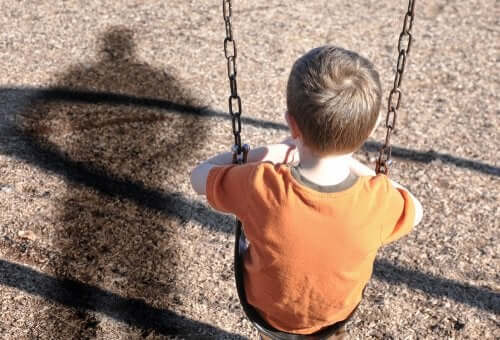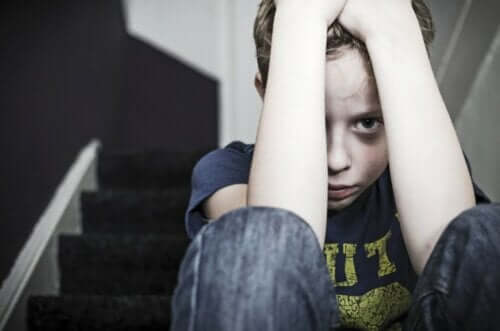How Suffering Affects Children's Brains


Written and verified by the psychologist Elena Sanz Martín
We usually make the mistake of believing children are compliant, adaptable and stoic. Besides, we believe that they’ll forget bad experiences once they grow up. In fact, in order to educate our kids, we make them go through situations we wouldn’t experience as adults. However, if we knew how suffering affects children’s brains, we’d think twice before doing anything to them.
If your partner is afraid or insecure about something, would you leave them in a dark room until they stop asking for help? You wouldn’t, right? Quite on the contrary, you’d hug them and stay by their side, making sure everything is ok. Then, why do we leave our babies every night in the dark, alone and afraid?
If a friend or your boss makes a mistake or behaves in a way you don’t approve, would you insult them or yell at them? Then, why do we do it with the little ones? In an effort to discipline them, we forget to be empathetic, respectful and loving. As a result, we don’t realize how much their suffering affects their development.
How suffering affects children’s brains
Children can experience suffering in many different ways. They can be victims of physical, sexual or psychological abuse. Besides, they can also suffer from their parents’ abandonment, rejection or neglect. Even well-intentioned parents can make their children suffer unintentionally.
The future effects will depend on the intensity of the child’s suffering, plus other variables. However, some studies have proven that childhood trauma seriously affects brain development.

Anxiety and hypervigilance
Researchers carried out a study to analyze how the brains of children who come from aggressive environments react. To do this, children had to look at a series of pictures of people with angry, threatening, sad and neutral faces. At the same time, their brains were scanned, in order to look for reactions to those stimuli.
The investigation concluded that children who came from violent homes reacted more intensely to the angry faces. Furthermore, when being exposed to those images, the amygdala and the anterior insula were suddenly activated. These regions of the brain are in charge of detecting possible dangers and threats. They also prepare the body to fight or escape in order to survive.
This is why these children’s brains are constantly alert, anxious and active, waiting for dangerous situations or threatens. As a result, they become hypervigilant.
Due to this situation, children suffer from emotional exhaustion and a high level of anxiety, they can’t control. In addition, this anxiety and hypervigilance may last until they become adults.
Antisocial personality
Another research on children who suffer from antisocial personality disorder revealed interesting information. When analyzing their brains through magnetic resonance imaging, it showed rapid development in certain areas. They believe this is the result of intense emotional suffering during childhood.

After experiencing such a hard situation, certain areas of the brain developed earlier, in order to prepare the child to face hardship. This is possible to observe, by recognizing excessive myelination, grey matter thinning and excessive white matter.
Notwithstanding, these children may end up being apathetic adults, without the ability of feeling remorse. This could be a person likely to commit a crime or to use other people for their own personal gain.
Suffering shapes children’s brains
Since childhood is such an important stage in our development, everything we learn during those years will shape our brain connections, thus, our personality. Childhood suffering can cause a strong impact on our brain development. As a result, it can even define our adult life.
Difficult situations experienced during childhood can lead to several mental disorders. So, the best thing you can do for your children is to provide them with respect, love and understanding. Remember that you’re shaping their future.
We usually make the mistake of believing children are compliant, adaptable and stoic. Besides, we believe that they’ll forget bad experiences once they grow up. In fact, in order to educate our kids, we make them go through situations we wouldn’t experience as adults. However, if we knew how suffering affects children’s brains, we’d think twice before doing anything to them.
If your partner is afraid or insecure about something, would you leave them in a dark room until they stop asking for help? You wouldn’t, right? Quite on the contrary, you’d hug them and stay by their side, making sure everything is ok. Then, why do we leave our babies every night in the dark, alone and afraid?
If a friend or your boss makes a mistake or behaves in a way you don’t approve, would you insult them or yell at them? Then, why do we do it with the little ones? In an effort to discipline them, we forget to be empathetic, respectful and loving. As a result, we don’t realize how much their suffering affects their development.
How suffering affects children’s brains
Children can experience suffering in many different ways. They can be victims of physical, sexual or psychological abuse. Besides, they can also suffer from their parents’ abandonment, rejection or neglect. Even well-intentioned parents can make their children suffer unintentionally.
The future effects will depend on the intensity of the child’s suffering, plus other variables. However, some studies have proven that childhood trauma seriously affects brain development.

Anxiety and hypervigilance
Researchers carried out a study to analyze how the brains of children who come from aggressive environments react. To do this, children had to look at a series of pictures of people with angry, threatening, sad and neutral faces. At the same time, their brains were scanned, in order to look for reactions to those stimuli.
The investigation concluded that children who came from violent homes reacted more intensely to the angry faces. Furthermore, when being exposed to those images, the amygdala and the anterior insula were suddenly activated. These regions of the brain are in charge of detecting possible dangers and threats. They also prepare the body to fight or escape in order to survive.
This is why these children’s brains are constantly alert, anxious and active, waiting for dangerous situations or threatens. As a result, they become hypervigilant.
Due to this situation, children suffer from emotional exhaustion and a high level of anxiety, they can’t control. In addition, this anxiety and hypervigilance may last until they become adults.
Antisocial personality
Another research on children who suffer from antisocial personality disorder revealed interesting information. When analyzing their brains through magnetic resonance imaging, it showed rapid development in certain areas. They believe this is the result of intense emotional suffering during childhood.

After experiencing such a hard situation, certain areas of the brain developed earlier, in order to prepare the child to face hardship. This is possible to observe, by recognizing excessive myelination, grey matter thinning and excessive white matter.
Notwithstanding, these children may end up being apathetic adults, without the ability of feeling remorse. This could be a person likely to commit a crime or to use other people for their own personal gain.
Suffering shapes children’s brains
Since childhood is such an important stage in our development, everything we learn during those years will shape our brain connections, thus, our personality. Childhood suffering can cause a strong impact on our brain development. As a result, it can even define our adult life.
Difficult situations experienced during childhood can lead to several mental disorders. So, the best thing you can do for your children is to provide them with respect, love and understanding. Remember that you’re shaping their future.
All cited sources were thoroughly reviewed by our team to ensure their quality, reliability, currency, and validity. The bibliography of this article was considered reliable and of academic or scientific accuracy.
- McCrory, E. J., De Brito, S. A., Sebastian, C. L., Mechelli, A., Bird, G., Kelly, P. A., & Viding, E. (2011). Heightened neural reactivity to threat in child victims of family violence. Current Biology, 21(23), R947-R948.
- Pujol, J., Harrison, B. J., Contreras-Rodriguez, O., & Cardoner, N. (2019). The contribution of brain imaging to the understanding of psychopathy. Psychological medicine, 49(1), 20-31.
This text is provided for informational purposes only and does not replace consultation with a professional. If in doubt, consult your specialist.








